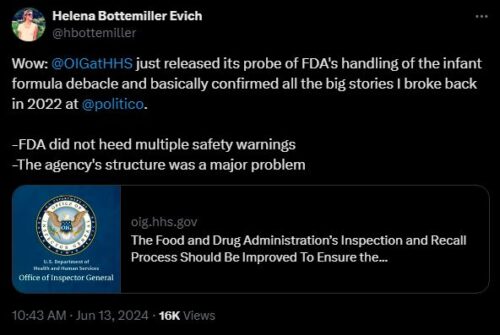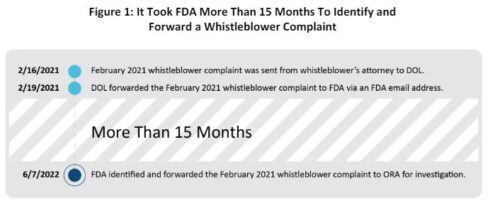Join Health Affairs for a virtual conversation between me and Angela Odoms-Young of Cornell University discussing the evolution of US food and nutrition policy, the current policy landscape, and thoughts on what lies ahead. It’s at 1:00 p.m. EDT. To join the Webinar, register here.
Inspector General faults FDA for the 2022 infant formula tragedy
The Department of Health and Human Service’s Inspector General has reported on its investigation of the FDA’s mis-handling of infant formula shortages a couple of years ago: The Food and Drug Administration’s Inspection and Recall Process Should Be Improved To Ensure the Safety of the Infant Formula Supply.
I see this as a direct result of Helena Bottemiller Evich’s reporting in Politico—the power of the press, indeed (she now writes Food Fix, to which I subscribe, and where she discusses this report).
In an earlier report, she detailed the history of FDA’s inspections of the Abbott laboratory and the agency’s surprising delay in getting Abbott to do a “voluntary” recall.
She, justifiably, takes some credit.

Food safety lawyer Bill Marler also had questions about the quality of production and FDA’s surprising lack of action.
What this is about
Infants who are not breastfed are completely dependent on infant formula. In 2022, contaminated powdered formula from Abbott Labs was associatied with the illness or deaths of several infants, Despite earlier complaints from whistleblowers about poor sanitation at Abbott plants, the FDA was slow to advise not using this formula.
At the time of the FDA advisory, one infant was ill with Salmonella Newport, and four were ill with Cronobacter sakazakii ); of these, two died—a shocking tragedy.
What the report says
The Inspector General summarizes the findings:
- FDA had inadequate policies and procedures to identify risks to infant formula and respond effectively
- FDA took more than 15 months to address a February 2021 Abbott facility whistleblower complaint. I
- FDA did not escalate an October 2021 whistleblower complaint to senior leadership
- FDA did one inspection 102 days after a whistleblower complaint was received.
- FDA did not initiate an infant formula recall under its FDA-required recall authority.

Why didn’t the FDA act?
One reason was probably because “FDA could not confirm that the Abbott facility’s products caused the infant illnesses or deaths because clinical isolates for the infants were not available or whole genome sequencing was not a match to the Abbott facility Cronobacter investigation findings.”
Another is likely to be inadequate staffing, but a third, I’m guessing, has to do with the culture of the FDA, which increasingly appears captured by the industries it is supposed to be regulating. The infant formula industry is highly concentrated and Abbott made something like 40% of it—even more reason to make sure the company was taking scrupulous care about safety.
The report instructs the FDA to do better. Let’s hope.

